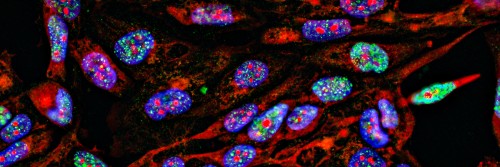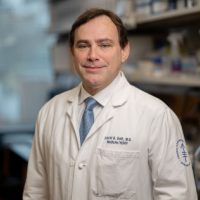
The History of the Center for Molecular Oncology
The Marie-Josée and Henry R. Kravis Center for Molecular Oncology (CMO) is a team of laboratory, computational, and clinical researchers at Memorial Sloan Kettering working together to translate new genomic technologies and molecular insights into diagnostic tools and individualized therapies. Established with a gift of $100 million from Marie-Josée and Henry R. Kravis Foundation, the CMO brings together researchers with many different areas of expertise — including cancer biology, pathology, bioinformatics, and systems biology — to undertake a vast, translational research program. For every type of cancer, archived tumor specimens and tissues obtained in clinical trials are comprehensively profiled using next-generation sequencing and other technologies. The molecular information of each tumor is then correlated with clinical data, including the patient’s outcome and response to therapy.
Goals of the Center for Molecular Oncology
The goal of the CMO is to expedite and streamline cancer genomics research to guide cancer treatment. Ultimately our vision is to fully deliver on the promise of precision oncology and to create better treatment options for all people with cancer. Thanks to our powerful combination of clinical and scientific resources focused exclusively on cancer, Memorial Sloan Kettering is in a unique position to reach this ambitious goal. The Marie-Josée and Henry R. Kravis Center for Molecular Oncology spans the full range of activities required to translate molecular insights into clinical innovations — from procuring and archiving patient tissues to pioneering the latest diagnostic tests and targeted therapies.
Impact on Clinical Care
The CMO has become an essential partner in the care that MSK provides people with cancer by ensuring that genomic sequencing with MSK-IMPACT® is offered as part of each patient’s diagnosis and care plan. Molecular information from tumors is linked with clinical data, including the patient’s outcome and response to therapy over time. These correlations guide each person’s care and can help doctors predict how future patients will respond to various treatments. The specialized teams that make up the CMO are at the heart of this process, supporting both researchers and clinicians with the tools needed to generate and interpret genomic data, then apply their insights in the lab or the clinic.
MSK-IMPACT®
MSK-IMPACT® (Integrated Mutation Profiling of Actionable Cancer Targets) is a targeted tumor sequencing test used to detect gene mutations and other critical genetic alterations in both rare and common cancers. Developed within the Marie-Josée and Henry R. Kravis Center for Molecular Oncology (CMO) and launched in 2014, the ultimate goal of the MSK-IMPACT® test is to use clinical molecular testing to improve oncologists’ ability to treat people with solid cancers by giving them a better understanding of the genetic underpinnings of each patient’s illness. MSK-IMPACT® is designed to detect alterations in 505 cancer-associated genes and is the first laboratory-developed tumor-profiling test to receive authorization from the U.S. Food and Drug Administration. The MSK-IMPACT® Heme test uses the same technology as MSK-IMPACT® to look for mutations and other important molecular changes in blood cancers, including leukemia, lymphoma, and multiple myeloma.
MSK-ACCESS®
The MSK-ACCESS® (Analysis of Circulating cfDNA to Evaluate Somatic Status) assay is a comprehensive liquid biopsy test that offers noninvasive cancer genomic profiling and disease monitoring. It involves the deep sequencing of 146 key cancer-associated genes selected from MSK’s solid tumor genomic-profiling assay, MSK-IMPACT®. MSK-ACCESS® is designed to detect genetic alterations in cfDNA (cell-free DNA) specimens, such as blood and other body fluids. MSK-ACCESS® was developed within the Marie-Josée and Henry R. Kravis Center for Molecular Oncology (CMO), and the test has been clinically validated and implemented by members of MSK’s Molecular Diagnostics Service in 2019, after receiving approval from the New York State Department of Health.
Direct enrollment to precision oncology trials
MSK’s Early Drug Development (EDD) Service is a team of doctors, nurses, and researchers exclusively dedicated to leading early-stage clinical trials of new therapies. In the past five years, the team has pioneered trials that resulted in eight FDA approvals of new targeted therapies. MSK-IMPACT® and MSK-ACCESS® are central to the EDD’s ability to identify MSK patients who would be good candidates for early-stage clinical trials. The team receives real-time notifications of sequencing results, which allows them to enroll patients quickly and begin their treatment without delay. The EDD has made historic breakthroughs, including leading the clinical trials that brought a new, highly effective drug for non-small cell lung cancer to patients with a specific gene mutation, as well as spearheading the development of the first-ever drug to act on a mutation in KRAS, a gene that is mutated in more than 25% of cancers and has long been considered impossible to target. The EDD also had a lead role in the development of the first drugs to receive FDA-authorization for a specific mutated gene irrespective of cancer type.
OncoKB
OncoKB™ is a precision oncology knowledge base developed at Memorial Sloan Kettering Cancer Center that contains biological and clinical information about genomic alterations in cancer. Alteration- and tumor type-specific therapeutic implications are classified using the OncoKB™ Levels of Evidence system, which assigns clinical actionability to individual mutational events. OncoKB™ was developed and is maintained by the Marie Josée and Henry R. Kravis Center for Molecular Oncology at Memorial Sloan Kettering Cancer Center. In 2021, the FDA granted partial recognition to OncoKB, making it the first database of its kind to receive this designation. The National Comprehensive Cancer Network also references OncoKB in its guidelines for treating non-small cell lung cancer and uterine cancer.
Clinical Genetics Service
Genetic counseling and cancer risk assessment is an important part of cancer care at Memorial Sloan Kettering. Based on genetic test results (such as MSK-IMPACT® ) and family cancer history, the Clinical Genetics Service (CGS) provides patients and family members with recommendations for surveillance and risk reduction. CGS’s aim is to provide people who have cancer and their family members understand how a diagnosis of cancer in one family member may impact the health of others. Knowing that a genetic predisposition to cancer exists in a family can help identify other relatives who are at risk for the disease. This knowledge can lead to cancer prevention and early intervention for entire families. Researchers in MSK’s Robert and Kate Niehaus Center for Inherited Cancer Genomics use a number of research methods to discover new pathways associated with inherited cancer risk. The Niehaus Center’s ultimate goal is to develop new approaches for precision cancer prevention and earlier detection as well as targeted treatments.
Clonal Hematopoiesis Clinic
MSK is home to a first-of-its-kind clinic for clonal hematopoiesis (CH), a condition driven by a genetic mutation in blood stem cells. People with CH are at higher risk of blood cancer and cardiovascular disease and have increased cancer mortality rates. MSK researchers were the first to discover the genetic basis of CH and link it to cancer. In the years since, researchers have mined genomic sequencing data collected through the CMO to build predictive models that can identify who is at the highest risk of progressing from CH to blood cancer. These patients are monitored at MSK to spot early signs of progression and intervene as soon as possible. At the same time, MSK scientists are conducting research to develop targeted therapies that can act on mutated stem cells while they are still benign, intercepting cancer before it ever starts.
Data Sharing
The CMO was founded with a fierce commitment to sharing information and resources to ensure that MSK patients and scientists were not the only ones benefiting from its expertise. Data from MSK-IMPACT®, MSK-ACCESS®, and other genomic testing led by researchers affiliated with the CMO has fueled the establishment of freely available databases that have informed research studies and cancer care on nearly every continent.
The Cancer Data Science Initiative
The Cancer Data Science Initiative (CDSI) is a strategic initiative led by Dr. Nikolaus Schultz, started as part of Memorial Hospital Translational Research in partnership with Computational Oncology and DigITs. Its mission is to support translational research at Memorial Hospital by abstracting and integrating real-world patient data from different clinical resources in near real-time and making it available in a deidentified format to clinicians, biologists, and computational scientists across the institution. Following the guidelines developed by Memorial Hospital (MH) Research Data Governance, CDSI aims to build on the success of the institution-wide MSK-IMPACT® data-sharing model and expand it to include clinical annotations, treatment and response data, and eventually data elements derived from pathology and radiology images. The initiative aims to provide a dynamic and modular data ecosystem that provides comprehensive patient profiles to improve translational research and ultimately patient care. These goals are reflected in the CDSI values to:
- Establish automated flow of deidentified data from patient charts and clinical tests
- Prioritize ease of data access and use, e.g. through the cBioPortal for Cancer Genomics
- Enable the development of innovative AI/ML-based outcome models
cBioPortal and AACR Project GENIE
The cBioPortal for Cancer Genomics is an open source, interactive analysis and visualization tool designed by MSK scientists to make data from large-scale cancer genomics projects more interpretable and accessible. The cBioPortal has grown exponentially, becoming a multi-institutional partnership that now serves as a hub for tens of thousands of researchers each month to explore the connections between cancer-related genetic mutations and clinical outcomes.
In 2015, the American Association for Cancer Research (AACR) launched AACR Project GENIE, a larger-scale version of the cBioPortal that gathers data from 19 international cancer centers. MSK quickly became the database’s largest contributor and remains so today.
Collaborations Across the Institution
Computational Oncology
Data science and computational oncology quickly became institutional priorities at MSK following the establishment of the CMO. These fundamental disciplines are essential to helping our researchers and doctors learn from each patient’s data and translate this knowledge into clinical practice. With philanthropic support, MSK established the Computational Oncology Service in 2018. It has since grown into a highly successful and deeply collaborative cross-departmental research effort that attracts top-tier talent to MSK. Computational teams lead their own studies and support the work of others at MSK, using artificial intelligence and other analytics methods to identify trends in patient demographics, disease progression, responses to therapy, and outcomes that would otherwise likely go undetected.
Functional Genomics Initiative
The Functional Genomics Initiative (FGI) was founded as a direct response to MSK-IMPACT®. Laboratory researchers involved in the program leverage the huge volume of information gleaned from tumor analyses to better understand how individual mutated gene included in the MSK-IMPACT® and MSK-ACCESS® assays promote cancer development and treatment resistance. To advance this work, the FGI makes a series of grants to basic and translational scientists each year, allowing MSK researchers to quickly pursue promising leads arising from the CMO genomic data as they strive to learn more about the genes and proteins that facilitate cancer growth, spread, and response to treatment. Scientists affiliated with the FGI have helped drive the continual expansion of the number of genes covered by MSK-IMPACT® by making recommendations for new additions based on emerging research at MSK and in the field.
Global Biomarker Development Program
MSK’s Global Biomarker Development Program is a nexus for liquid biopsy research and clinical validation. Since 2017, the program has helped accelerate the creation, approval, and routine clinical use of new liquid biopsy-based biomarker assays and technologies that promise to improve clinical decision-making.
From its initial work on tests for people with prostate cancer, the program has dramatically expanded and now includes more than 60 MSK doctors and scientists. Its unique operational model relies on partnerships with biotechnology and pharmaceutical companies that are developing biomarker tests. Support from these partners allows our team to advance their own research efforts while working to validate outside assays and determine their clinical utility, a critical step toward FDA approval.
Robert and Kate Niehaus Center for Inherited Cancer Genomics
Founded in 2015, the Robert and Kate Niehaus Center for Inherited Cancer Genomics has become an unsurpassed translational research program for understanding, managing, and preventing inherited cancers. MSK-IMPACT® data plays a major role in the center’s efforts to identify inherited causes of cancer and help families understand and reduce their risk and has been integral to pivotal studies published by the center. Findings made through the Niehaus Center are shaping screening recommendations and have changed MSK’s approach to genetic testing for the family members of people with cancer.
Featured Publications
Genomic characterization of metastatic patterns from prospective clinical sequencing of 25,000 patients
CMO investigators analyze tumor genomic profiling data and clinical information on metastatic events and outcomes from over 25,000 patients with 50 different cancer types, to investigate if a tumor’s genetic mutations can predict whether and where cancer will spread. While some mutations are found to be slightly more common in tumors prone to certain metastatic events, no single mutation or group of mutations could predict with absolute certainty where a particular tumor would metastasize. The researchers find that some mutations, called DNA copy-number changes, are more common in metastatic tumors than in primary tumors, and these changes are predictive of metastatic potential when found in primary tumors. The dataset is being made publicly available to other researchers who wish to explore the relationship between genomic events and cancer progression.
The context-specific role of germline pathogenicity in tumorigenesis
In a new study, a team of investigators is reporting how information about inherited genetic mutations (called germline mutations) can be combined with data from mutations found only in tumors (called somatic mutations) to create a deeper understanding of how tumors grow. In the paper, published November 5, 2021, in Nature Genetics, the researchers explain that the influence of germline mutations on each patient’s cancer is varied and based on multiple factors.
Genetic Ancestry Correlates with Somatic Differences in a Real-World Clinical Cancer Sequencing Cohort
For certain types of cancer, knowing one’s precise genetic ancestry can be important for properly assessing genetic risk factors for the disease and weighing possible treatments. CMO computational biologists show that data from MSK-IMPACT® — which sequences only a subset of genes in the human genome — can be used to reliably establish someone’s genetic ancestry. They also identify a discrepancy in the rates of clinically actionable alterations in patients of African ancestry versus patients of European ancestry as determined by MSK’s OncoKB® database, due to which patients of African ancestry had, on average, fewer options for drugs matching those alterations.
More publications
- Deep-Learning Model for Tumor-Type Prediction Using Targeted Clinical Genomic Sequencing Data Cancer Discov, 2024
- Quantifying the Expanding Landscape of Clinical Actionability for Patients with Cancer Cancer Discov, 2024
- Tracking tumour evolution in glioma through liquid biopsies of cerebrospinal fluid Nature, 2019
- Widespread Selection for Oncogenic Mutant Allele Imbalance in Cancer Cancer Cell, 2018
- Genome doubling shapes the evolution and prognosis of advanced cancers Nat Genet, 2018
- HER kinase inhibition in patients with HER2- and HER3-mutant cancers Nature, 2018
- Therapy-Related Clonal Hematopoiesis in Patients with Non-hematologic Cancers Is Common and Associated with Adverse Clinical Outcomes Cell Stem Cell, 2017
- OncoKB: A Precision Oncology Knowledge Base JCO Precis Oncol, 2017
- Mutational landscape of metastatic cancer revealed from prospective clinical sequencing of 10,000 patients Nat Med, 2017
- Vemurafenib in Multiple Nonmelanoma Cancers with BRAF V600 Mutations N Engl J Med, 2015
Milestones
2014-2016: Establishing infrastructure for collaborative science
2014: The Marie-Josee and Henry R. Kravis Center for Molecular Oncology (CMO) is established with a landmark gift
The Marie-Josée and Henry R. Kravis Center for Molecular Oncology (CMO) is named in honor of Marie-Josée and Henry R. Kravis, whose transformative gift of $100 million will make it possible to realize the promise of precision oncology and support the development of new, individualized cancer therapies and diagnostic tools. To support these goals, the CMO establishes two unique laboratories: one for cell-free DNA (cfDNA) and the other for computational oncology.
The Cell-free DNA Laboratory is created in collaboration with the Department of Pathology and Laboratory Medicine to respond to the growing interest in non-invasive diagnosis and monitoring of disease in cancer patients.
The CMO Computational Oncology Lab houses teams who lead their own studies and support the work of others at MSK, using artificial intelligence and other analytics methods to identify trends in patient demographics, disease progression, responses to therapy, and outcomes that would otherwise likely go undetected. Read More
2014: MSK-IMPACT® is launched by the CMO and the Molecular Diagnostic Service (MDS)
The Integrated Mutation Profiling of Actionable Cancer Targets (MSK-IMPACT®) sequencing test is developed to detect gene mutations and other critical genetic aberrations in both rare and common cancers. The test results give MSK physicians the ability to match people with targeted agent based on the individual tumor’s molecular profile, guide treatment choices and can identify people who are candidates for clinical trials testing targeted therapies.
The Cell-free DNA Laboratory is established
In collaboration with the Department of Pathology and Laboratory Medicine, the CMO establishes the Cell-free DNA Laboratory. Detection of circulating cell-free DNA (cfDNA) in body fluids is of growing interest for non-invasive diagnosis and monitoring of disease in cancer patients.
2015: Centralizing Genomic Data
To facilitate in-depth analysis of clinical MSK-IMPACT data, the CMO creates a centralized resource for investigators to data mine – promoting the ideation of new research questions. The cBioPortal for Cancer Genomics is an open source, interactive analysis and visualization tool designed by MSK scientists to make data from large-scale cancer genomics projects more interpretable and accessible. In 2015, the American Association for Cancer Research (AACR) launches Project GENIE which builds upon the infrastructure and concept of the cBioPortal. AACR Project GENIE is a publicly accessible cancer registry of clinico-genomic data gathered from leading international cancer centers. MSK is the lead contributor of data to the AACR Project GENIE. Read More
2015: MSK Researchers Publish Landmark “Basket Study”
Researchers at Memorial Sloan Kettering pioneer the concept of basket trials that test therapies on tumors regardless of where they originate in the body, as they may carry the same genetic mutations. MSK investigators carry out a histology-independent early phase 2 “basket” study of vemurafenib in patients with nonmelanoma cancers harboring BRAF V600 mutations and observe preliminary vemurafenib activity in non–small-cell lung cancer and in Erdheim–Chester disease and Langerhans’-cell histiocytosis. MSK investigators demonstrate that histologic context is an important determinant of response in BRAF V600–mutated cancers. Read More
2017-2020: Innovation and rapid expansion of genomic technologies
2017: MSK-IMPACT: FDA Authorized Test profiles 10,000 Patients
The U.S. Food and Drug Administration (FDA) authorizes the MSK-IMPACT® test for analyzing patient tumors. Michael Berger, PhD, Ahmet Zehir, PhD, and colleagues analyze data from the first 10,336 patients profiled by MSK-IMPACT®. The study found that 37% of their patient cohort had at least one mutation that could be targeted by a therapeutic drug available in a clinical trial or as standard of care, leading to streamlined care and enrollment into clinical trials. Read More
2018: WES Recapture and Analysis
The CMO initiates a large-scale project to conduct Whole Exome Sequencing (WES) on DNA leftover from prior MSK-IMPACT tests. The CMO Computational Science (CCS) team develops and launches a novel analysis pipeline to meet the need for analysis of this WES dataset. Later in 2020, a repository is created to enable sharing of the WES Recapture dataset with all MSK investigators and facilitate analysis.
2019: MSK-ACCESS® Receives New York State Approval
The ‘MSK-Analysis of Circulating cfDNA to Evaluate Somatic Status (ACCESS)’ test is developed and tested in the CMO Technology Innovation Lab. MSK-ACCESS® is a liquid biopsy assay that profiles circulating cell-free DNA (cfDNA) from the blood plasma of cancer patients to non-invasively study somatic tumor alterations. In 2019, the New York State Department of Health approves the MSK-ACCESS® assay for clinical use. Concurrently, the MSK-ACCESS® assay is offered as a liquid biopsy test in the Molecular Diagnostic Service. Read More
2020: 50,000 patients are profiled by MSK-IMPACT®
Technicians from the Molecular Diagnostics Service at MSK analyze samples from over 50,000 patients by Next Generation tumor genetic testing such as MSK-IMPACT® and MSK-ACCESS®, that look for cancer-causing mutations (changes) in the genome. Read More
2021-2024: Focus on data dissemination and accessibility
2021: Precision Oncology Knowledge Base (OncoKB) receives FDA Recognition
The U.S. Food and Drug Administration grants partial recognition to the CMO’s Oncology Knowledge Base: OncoKB. OncoKB becomes the first tumor mutation database to be included in the Public Human Genetic Variant Databases. Read More
2022: Studies on cancer progression and genetic ancestry expand our understanding of cancer treatment
CMO investigators analyze tumor genomic profiling data and clinical information on metastatic events and outcomes from over 25,000 patients with 50 different cancer types, to investigate if a tumor’s genetic mutations can predict whether and where cancer will spread. The researchers find that some mutations, called DNA copy-number changes, are more common in metastatic tumors than in primary tumors, and these changes are predictive of metastatic potential when found in primary tumors. Read More
For certain types of cancer, knowing one’s precise genetic ancestry can be important for properly assessing genetic risk factors for the disease and weighing possible treatments. CMO computational biologists show that data from MSK-IMPACT® can be used to reliably establish someone’s genetic ancestry. They also identify a discrepancy in the rates of clinically actionable alterations in patients of African ancestry versus patients of European ancestry as determined by MSK’s OncoKB® database, due to which patients of African ancestry had, on average, fewer options for drugs matching those alterations. Read More
2023: 100,000 tumor/liquid biopsy samples are profiled by clinical MSK-IMPACT® and MSK-ACCESS®
Technicians from the Molecular Diagnostics Service at MSK analyze over 100,000 tumors by Next Generation tumor genetic testing such as MSK-IMPACT® and MSK-ACCESS®, that look for cancer-causing mutations (changes) in the genome. Read More
2023: The Cancer Data Science Initiative
The Cancer Data Science Initiative (CDSI) announces their first data release containing clinical data elements derived from electronic health records using natural language processing (NLP) methods. This release supports the CDSI’s goal to make clinical data accessible and interpretable to all MSK clinicians and investigators and promotes the generation of new research questions.
2024: CMO Computational Biologists use AI to Predict Tumor Type
Tumor type guides clinical treatment decisions in cancer, but histology-based diagnosis remains challenging. Genomic alterations are highly diagnostic of tumor type but the most accurate methods are not clinically feasible and predict across limited cancer types. CMO computational biologists use AI to develop a highly accurate tumor-type prediction model, designed specifically for clinical implementation. This model relies only on widely used cancer gene panel sequencing data, predicts across 38 distinct cancer types, and supports integration of patient-specific nongenomic information for enhanced decision support in challenging diagnostic situations. Read More




Leadership

Co-Director, Marie-Josée & Henry R. Kravis Center for Molecular Oncology

Co-Director, Marie-Josée & Henry R. Kravis Center for Molecular Oncology; Chief Attending, Clinical Computational Diagnostics Service, Department of Pathology and Laboratory Medicine

Director, Cancer Data Science Initiative; Head of Knowledge Systems, Marie-Josée & Henry R. Kravis Center for Molecular Oncology; Attending Computational Oncologist, Department of Epidemiology & Biostatistics

Associate Director, CMO

Senior Director, Translational Research Management
Executive Committee

Investigator, Howard Hughes Medical Institute; Marie-Josée and Henry R. Kravis Chair in Human Oncology and Pathogenesis; Chair, Human Oncology and Pathogenesis Program

Co-Director, Marie-Josée & Henry R. Kravis Center for Molecular Oncology

Robert and Kate Niehaus Chair in Inherited Cancer Genomics; Vice Chair, Academic Affairs, Department of Medicine

Chair, Department of Pathology and Laboratory Medicine; James Ewing Alumni Chair of Pathology

Chief, Molecular Diagnostics Service; William J. Ruane Chair in Molecular Oncology

Co-Director, Marie-Josée & Henry R. Kravis Center for Molecular Oncology; Chief Attending, Clinical Computational Diagnostics Service, Department of Pathology and Laboratory Medicine

Edward P. Evans Endowed Chair for Myelodysplastic Syndromes (MDS) at MSK; Senior Vice President, Memorial Hospital, Translational Research

Chair, Cancer Biology & Genetics Program, SKI; Chair, Geoffrey Beene Cancer Research Center; Investigator, Howard Hughes Medical Institute

Chief, Computational Oncology Service; Nicholls-Biondi Chair
If you would like more information about the Marie-Josée and Henry R. Kravis Center for Molecular Oncology or support our research, please contact:
Kristina Knapp, Head, Translational Research Administration
Marie-Josée & Henry R. Kravis Center for Molecular Oncology
Memorial Sloan Kettering Cancer Center
1275 York Avenue
New York, NY 10065
Email: knappk@mskcc.org